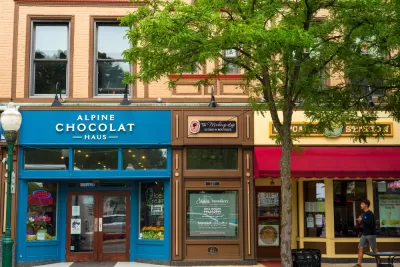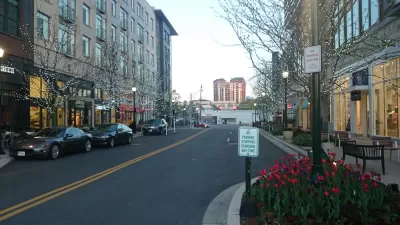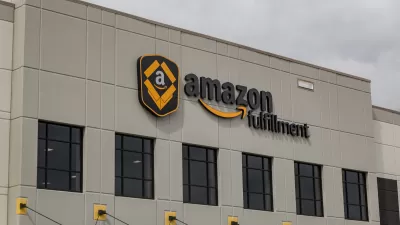Stores are an integral part of the cityscape. So how will online shopping change what we see in the coming years?

Courtney Humphries considers ways cities will change as e-commerce and related delivery systems continue to evolve. She starts by taking a look back as how cities got to this point—from department stores in downtowns to suburban strip malls and then large, enclosed malls and big-box retail.
Shopping became separated by zoning and the need for shoppers to access store location by car. "Mixed-use developments can be seen as an attempt to suture earlier tears in the urban fabric left by 20th-century planning. Meanwhile, investment and affluent residents have returned to urban centers, and many of the showpiece malls in suburbs are struggling," says Humphries.
Today online shopping seems both ubiquitous and commonplace, even though, as Humphries points out, online purchases make up less than 10 percent of retail transactions. Still, physical stores are getting smaller and the demand for warehouse space continues to increase.
In addition, brick-and-mortar stores have felt the pressure to deliver something more in the realm of an experience, which extends from the store into the downtown and surrounding areas. "[Robert] Gibbs says that small retail stores can’t just offer standard goods you could easily get delivered; they need to offer something local, fresh, or luxurious, with excellent customer service. What’s outside the store is also important," reports Humphries.
As for what the future holds in store, futurists are predicting everything from residential buildings designed with storage spaces specifically for deliveries to stores that function largely as warehouses. A crop of empty storefront spaces could also provide a wealth of opportunities for new and innovative uses—or not.
"Inequalities in the retail landscape could also worsen, with lower-income neighborhoods getting more shuttered storefronts and dollar stores, and higher-income areas getting beautiful landscaping and cultivated 'experiences,'" says Humphries.
FULL STORY: How Amazon Prime will change the way our cities look

Alabama: Trump Terminates Settlements for Black Communities Harmed By Raw Sewage
Trump deemed the landmark civil rights agreement “illegal DEI and environmental justice policy.”

Planetizen Federal Action Tracker
A weekly monitor of how Trump’s orders and actions are impacting planners and planning in America.

The 120 Year Old Tiny Home Villages That Sheltered San Francisco’s Earthquake Refugees
More than a century ago, San Francisco mobilized to house thousands of residents displaced by the 1906 earthquake. Could their strategy offer a model for the present?

In Both Crashes and Crime, Public Transportation is Far Safer than Driving
Contrary to popular assumptions, public transportation has far lower crash and crime rates than automobile travel. For safer communities, improve and encourage transit travel.

Report: Zoning Reforms Should Complement Nashville’s Ambitious Transit Plan
Without reform, restrictive zoning codes will limit the impact of the city’s planned transit expansion and could exclude some of the residents who depend on transit the most.

Judge Orders Release of Frozen IRA, IIJA Funding
The decision is a victory for environmental groups who charged that freezing funds for critical infrastructure and disaster response programs caused “real and irreparable harm” to communities.
Urban Design for Planners 1: Software Tools
This six-course series explores essential urban design concepts using open source software and equips planners with the tools they need to participate fully in the urban design process.
Planning for Universal Design
Learn the tools for implementing Universal Design in planning regulations.
Clanton & Associates, Inc.
Jessamine County Fiscal Court
Institute for Housing and Urban Development Studies (IHS)
City of Grandview
Harvard GSD Executive Education
Toledo-Lucas County Plan Commissions
Salt Lake City
NYU Wagner Graduate School of Public Service





























